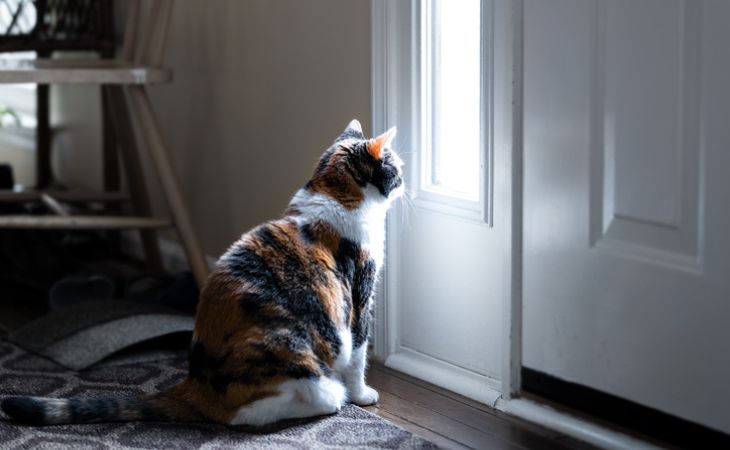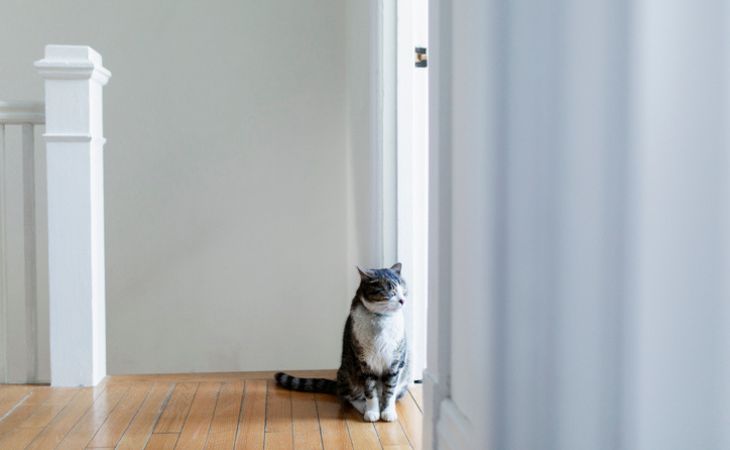To go to work every day, you have to leave your cat at home alone. They might also need to stay at home alone when you visit relatives, go on a weekend outing with friends, or on a trip. The absence of a human can affect a cat’s well-being. For this reason, it’s important to take the right steps to make sure your pet isn’t unhappy when you’re not there. In this article, we’ll help you find out how long your feline can handle spending time alone, and how to manage the situation properly.
How long can you leave your cat alone?
You can leave your cat alone for 1 to 3 days maximum as long as you guarantee optimal living conditions at your house. The shorter your absence is, the less your animal’s well-being will be affected. You need to return home as early as possible to take care of your cat’s food and litter. Your cat’s behavior when faced with solitude will depend on many factors.
- age,
- state of health,
- level of interaction with humans,
- lifestyle.
During the first few weeks, a newly-adopted kitten needs to identify reliable sensory cues in their new environment. For a quick and successful acclimatization, it’s best to avoid leaving your kitten home alone for more than 24 hours several times a week. In general, the older a cat is, the more independent they are, and the better they know how to handle solitude. You can also leave your cat at home for longer if they like to venture outside. They’ll notice your absence less if they are out having fun outdoors with other cats.
When your cat is not feeling well, they need special care and attention. They cannot stay alone all day. Ideally, someone should be home to provide the necessary treatment at the right times. They should also be there to take good care of their hygiene and feed them suitably. If your cat is a senior, they need you more than ever. If this is the case, reduce the amount of times you leave them alone as much as possible. Some felines, no matter their age, need human attention more than others. They are used to spending most of their day with humans and receiving attention and affection.
Leaving your cat alone at the house: how do you go about it?
Your pet needs to progressively get used to your absence. You can, for example, leave them alone for an hour the first time, then four hours the second time, eight hours another time and so on. With a kitten, it is not ideal to leave for more than two days for the first occasion. Doing this progressively will leave time for your pet to feel better in times of loneliness. In addition, having a camera or video surveillance at home is a real plus. You can better observe your cat’s behavior when they are all alone.
Analyze how they act to better prepare for future absences and guarantee optimal comfort. You’ll be able to go about your day more peacefully without worrying about your cat’s safety. Learn also to quickly recognize repeated signs of boredom and nervousness after a long or short absence:
- destruction of objects,
- uncleanliness,
- excessive grooming,
- prolonged meowing,
- bulimia, etc.
If your cat is healthy, this can just translate as your cat not being able to handle solitude very well. You can search for the appropriate means to remedy this during your next outings.
You might find this Letsgetpet article helpful: How to keep your cat stimulated on a daily basis

Create optimal living conditions for your cat
To prevent your cat from noticing your absence as much as possible, put into practice these helpful tips.
Take good care of your cat when they are left at home alone
If you need to leave your cat alone for more than 24 hours, place several clean litter boxes out so that your cat can stay clean. They also need to say appropriately hydrated throughout the day. For this, you can use a specialized fountain. This makes sure that at all times there is fresh and clean water to hydrate your pet. Drinking crystalline water that is oxygenated is beneficial for their health and well-being. Get them accustomed to drinking from a fountain before leaving them alone. You can also leave out protected hydration points around the house. Ideally, the water should be changed every 24 hours.
To feed your cat, cat feeders are your best friend. These useful devices allow you to serve your cat the adequate amount of food every time. Opt for an automatic model that allows you to choose the times to give meals to your feline. You can also activate the feeder from a distance thanks to special applications if you have a wifi-connected food distributor. To ensure that only your cat has access to the kibble, feeders with microchip detection are the best choice.
Prepare toys to entertain your cat while they are alone
If your cat is used to playing a lot with you, you need to prepare the house a bit to keep them from getting bored while alone. When you return, a cat that was really bored can even develop a defensive attitude and show their flagrant disinterest for your affectionate gestures. If you know your cat well, you surely have an idea of the activities and toys that they prefer. Place a cat tree ideally close to a lighted zone of your living room. Your companion will be able to scratch, sleep, and even do some acrobatics that are good for the health and muscles.
A cat carrier is typically used as a napping area when not being used for transoirt, but can occasionally be transformed into a toy for your companion. Other ideas are excellent for entertainment:
- in the shape of an organ,
- electric balls,
- pillows,
- chew toys in the shape of mice,
- catnip toys,
- balls with bells.
You can also adopt a dog, as they can be perfect playmates when you’re away. Once you’re back home, show your feline that you’ve missed them by giving them cuddles or a tasty snack.
You might find this Letsgetpet article useful: Cohabitation between a dog and an adult cat
Keep your cat safe while they are alone at home
Certain solutions sold at the pharmacy are made with natural pheromones that fight against stress related to solitude. Before using it, ask for your vet’s opinion. Diffusing these special scents can help to calm your cat during your absence. Be sure that the rooms are properly ventilated and at a good temperature before leaving your cat alone. Air out the space appropriately to have an optimal amount of fresh air in the room. For you cat’s safety, keep the bathroom closed. You will avoid, for example, an accidental drowning in the toilet.
Put away all sharp or pointy objects that can risk hurting your cat. They should not be able to access household cleaning products either, as their consumption can be harmful. Also, check that no household electronic devices present a significant risk of electric shock. If your feline loves the outdoors, add a cat flap that opens on the recognition of a microchip. This prevents any other unwanted pets from entering while you’re not there.
Leaving your cat alone during a long period of time
If you have to leave your cat alone for more than 3 days, the best solution is to have them looked after by someone you trust. This could be a friend, a neighbor or a professional pet sitter. The person you choose should have the main documents you need to rescue your pet in an emergency (insurance, care booklet, passport, etc.). Keep in touch with your pet sitter on a daily basis to check up on him/her and, if necessary, make video calls. You may wish to place your pet in a specialized boarding facility before your long absence.
This Letsgetpet article might also be helpful: Understanding your cat’s emotions

